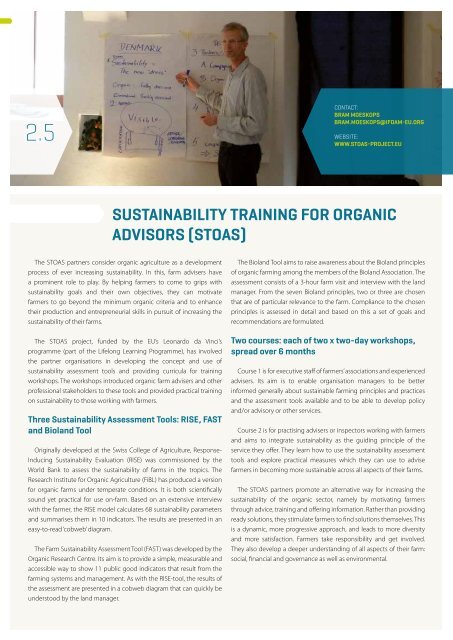tpo_dossier_action-plan-for-innovation-and-learning_201406
tpo_dossier_action-plan-for-innovation-and-learning_201406
tpo_dossier_action-plan-for-innovation-and-learning_201406
You also want an ePaper? Increase the reach of your titles
YUMPU automatically turns print PDFs into web optimized ePapers that Google loves.
202.5CONTACT:BRAM MOESKOPSBRAM.MOESKOPS@IFOAM-EU.ORGWEBSITE:WWW.STOAS-PROJECT.EUSUSTAINABILITY TRAINING FOR ORGANICADVISORS (STOAS)The STOAS partners consider organic agriculture as a developmentprocess of ever increasing sustainability. In this, farm advisers havea prominent role to play. By helping farmers to come to grips withsustainability goals <strong>and</strong> their own objectives, they can motivatefarmers to go beyond the minimum organic criteria <strong>and</strong> to enhancetheir production <strong>and</strong> entrepreneurial skills in pursuit of increasing thesustainability of their farms.The STOAS project, funded by the EU’s Leonardo da Vinci’sprogramme (part of the Lifelong Learning Programme), has involvedthe partner organisations in developing the concept <strong>and</strong> use ofsustainability assessment tools <strong>and</strong> providing curricula <strong>for</strong> trainingworkshops. The workshops introduced organic farm advisers <strong>and</strong> otherprofessional stakeholders to these tools <strong>and</strong> provided practical trainingon sustainability to those working with farmers.Three Sustainability Assessment Tools: RISE, FAST<strong>and</strong> Biol<strong>and</strong> ToolOriginally developed at the Swiss College of Agriculture, Response-Inducing Sustainability Evaluation (RISE) was commissioned by theWorld Bank to assess the sustainability of farms in the tropics. TheResearch Institute <strong>for</strong> Organic Agriculture (FiBL) has produced a version<strong>for</strong> organic farms under temperate conditions. It is both scientificallysound yet practical <strong>for</strong> use on-farm. Based on an extensive interviewwith the farmer, the RISE model calculates 68 sustainability parameters<strong>and</strong> summarises them in 10 indicators. The results are presented in aneasy-to-read ‘cobweb’ diagram.The Farm Sustainability Assessment Tool (FAST) was developed by theOrganic Research Centre. Its aim is to provide a simple, measurable <strong>and</strong>accessible way to show 11 public good indicators that result from thefarming systems <strong>and</strong> management. As with the RISE-tool, the results ofthe assessment are presented in a cobweb diagram that can quickly beunderstood by the l<strong>and</strong> manager.The Biol<strong>and</strong> Tool aims to raise awareness about the Biol<strong>and</strong> principlesof organic farming among the members of the Biol<strong>and</strong> Association. Theassessment consists of a 3-hour farm visit <strong>and</strong> interview with the l<strong>and</strong>manager. From the seven Biol<strong>and</strong> principles, two or three are chosenthat are of particular relevance to the farm. Compliance to the chosenprinciples is assessed in detail <strong>and</strong> based on this a set of goals <strong>and</strong>recommendations are <strong>for</strong>mulated.Two courses: each of two x two-day workshops,spread over 6 monthsCourse 1 is <strong>for</strong> executive staff of farmers’ associations <strong>and</strong> experiencedadvisers. Its aim is to enable organisation managers to be betterin<strong>for</strong>med generally about sustainable farming principles <strong>and</strong> practices<strong>and</strong> the assessment tools available <strong>and</strong> to be able to develop policy<strong>and</strong>/or advisory or other services.Course 2 is <strong>for</strong> practising advisers or inspectors working with farmers<strong>and</strong> aims to integrate sustainability as the guiding principle of theservice they offer. They learn how to use the sustainability assessmenttools <strong>and</strong> explore practical measures which they can use to advisefarmers in becoming more sustainable across all aspects of their farms.The STOAS partners promote an alternative way <strong>for</strong> increasing thesustainability of the organic sector, namely by motivating farmersthrough advice, training <strong>and</strong> offering in<strong>for</strong>mation. Rather than providingready solutions, they stimulate farmers to find solutions themselves. Thisis a dynamic, more progressive approach, <strong>and</strong> leads to more diversity<strong>and</strong> more satisf<strong>action</strong>. Farmers take responsibility <strong>and</strong> get involved.They also develop a deeper underst<strong>and</strong>ing of all aspects of their farm:social, financial <strong>and</strong> governance as well as environmental.


